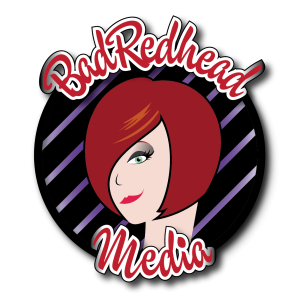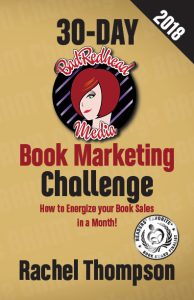This Is The Reason Your Author Platform Impacts Book Sales
How much impact does your author platform have on book sales? People ask me this all the time — they want hard numbers.
Author: If I tweet about this or that for three months, if I post on my Facebook page about my book or share a few reviews, if I share a recipe board on Pinterest…how many books will I sell?
Me: There’s no way I can give you a hard number. There are too many factors to consider.
Author: So, 10? 50? 100?
(One person told me that even though she’s writing a book, she’s “not an author,” so she won’t need to market it; though she fully expects people to “just know to buy it.” Um, okay.)
It doesn’t work like that: there’s no easy button. Let’s deconstruct.
Writing Is A Business — So Be Professional
Pardon me while I’m a bit indelicate here, but please, take your head out of your ass for a second. Why do people believe that a few tweets will equal book sales? It boggles my mind. Writing is great — I love it. I encourage anyone who feels they have the talent to pursue the craft, work with professionals, and create an amazing book which will have the greatest chance of catching the eye of a reader to do so.
But there’s the rub: how to catch the eye of a reader. With 1,000 books released daily in the US (Source, UNESCO via Wikipedia), how will readers, book bloggers, book clubs, and book reviewers find your book at all? By marketing! Marketing is a function of a business. And publishing is a business.
If your business plan is to twiddle around on Facebook and whine about how your book isn’t selling because you’re not doing any marketing, then that’s your problem. I’ve written exhaustively about what you need to create your author platform, and how to build relationships with readers, as have experts like Jane Friedman and Joanna Penn, who are amazing. Read, research, and do the work.
Tip: Being aggressive with readers, book bloggers, and book reviewers will get you nowhere, except banned. Book bloggers, especially, talk to each other. Be polite, use your inside voice, learn your environment and the culture (whether that’s bloggers, social media, or book clubs). The Golden rule applies.
Build Relationships
Building relationships take time, sometimes years. I met my current editor back when I first started on Twitter in 2009, and we met in real life at a conference when I visited New York City in 2012. Not once did I hit her up to represent me, nor did I pitch her my books. She did become my confidante and mentor, and when the timing was right, I was thrilled that she jumped at the chance to present me to Lisa Hagan, literary agent, who signed me on the spot (this was after I self-published my first three books, developed a large author platform, sexual abuse advocacy, signed with a (now-defunct) hybrid publisher, wrote another book, directed an imprint, and have two works in progress and another series in the hopper).
I’m now back to self-publishing, yet the experience was amazing and I value it immensely.
Relationships don’t happen overnight, despite your impression that someone got lucky with their first book. Sure, it happens to that rare author, but 99% of the time, that author has been writing for many years, and in all likelihood, knows someone who knows someone whose grandmother’s first cousin worked for the agent’s cleaning lady. I’m not saying it’s nepotism, not at all — we earn our stripes through talent. But those relationships can open a firmly closed door.
While writing is an art, publishing is and always has been about making money.
Write more books. Most authors who find success have written several books before they get picked up by an agent or publisher. Build more relationships, especially with readers. Be authentically you.
Rushing into publishing to make a ton of money quickly is usually a losing proposition which reeks of desperation. Readers know that you’re churning out formulaic books every month and rarely stick around. (Big names who do that already have a huge following, publicists, and unlimited budgets.)
Tip: stop following only other authors on Twitter and Facebook. Connect with readers, book clubs, book bloggers, and book reviewers. Then, talk to them. Not at them. Don’t pitch them. Don’t sell them. Talk to them, ya know, like people.
Many Factors Result in Book Sales — Not Just One
Think of the planks of a platform or the spokes of a bicycle — they all have to work together to form your author platform, which in turn helps you sell books (but can’t guarantee sales). Why no guarantee?
As a consultant, I can do (or help you do) everything I’m going to mention below and your sales can still be awful. Why? Maybe your book just isn’t that well written — that’s a hard truth. You may think it’s the best book ever, but the reviews are brutal. That’s a sure sign to pull it, work with a professional editor, perhaps redesign the cover with a professional graphic designer, and try again.
Or maybe the book is truly wonderful, but you refuse to do any social media, blogging, or advertising. How then will people know about your book? Maybe the price is outrageously high. What makes your book stand out form the sea of 30,000 new releases every month? If you can’t answer that, then you really need to decide if writing is for you, because writing is only half of the equation.
Here’s a simple analogy:
You decide to sell lemonade. You make the lemonade, investing in all the best ingredients. You set up outside on a hot day, knowing people will be thirsty, with a table, chairs, and a large umbrella you borrowed from the nice old lady next door. However, you ran out of time and supplies, so you have no signs. Oh well, people will see you and know that you have lemonade. You’re sure of it.
Kenny from across the street also is selling lemonade. His dad helped him make huge signs “KENNY’S LEMONADE 50c” which they’ve tacked up all over the neighborhood and in bright neon on his booth. Kenny’s booth is super swamped, while nobody is coming over to yours. Mrs. McDoogle even grabbed her umbrella and took it over to Kenny. That made you sad.
Marketing and selling books are no different. You have to make the signs.
Reality check: Listen, I get the feeling of selling our souls. I’m a creative, too. How do we do this business stuff when we hate doing the business stuff? You just do it. You need to accept that books are a commodity, something people purchase. Books are a product for sale. Books are a product that you would like to make money from. Money = business. That’s the world we live in.
What Makes Up Your Author Platform? A Basic List:
- Active and interactive social media (Twitter; Facebook — both a personal account to connect not sell, and an author page; Google+ brand page, and either Pinterest or Instagram; and, depending on your demographic, LinkedIn or Snapchat)
- StumbleUpon and Medium
- A fully SEO-optimized website and blog
- Blogging consistently (minimum once-weekly)
- Minimum 25-50 reviews of your book (not anything magical as some folks seem to hope; simply good optics)
- Blog tour (debatable, but helpful for visibility; not so much for book sales)
- Awards and/or writing contest wins
- Guest articles, interviews, blogging
- Writing for publications
- Advertising
- Subscriber list and Email newsletters
- Promotions, contests, giveaways
- and, most importantly, building long-term relationships with influencers and readers!
For more detailed information on your author platform, here’s a great, affordable guide by Barb Drozdowich, The Author’s Platform: A Beginner’s Guide (Amazon, $2.99). Learn free book marketing every week during my weekly #BookMarketingChat on Twitter (6pm pst/9pm est). Not a Twitter fan? Fine — read the free summaries on Facebook.
So, will you sell fifty books per month if you do All The Things? Who knows? I guarantee that if you have a plan, and you work the plan, you will sell more than if you didn’t do any of it. (That is, unless you’re annoying and spammy, and then you’re on your own.)
If you want to just write, then just write; don’t do any of what I mentioned above. However, if you want to sell books, then learn how to market your books. Balance the creative with the business and do the work.
For a more detailed plan on developing your book marketing, purchase Rachel’s new book (in eBook OR print),
The BadRedhead Media 30-Day Book Marketing Challenge now on Amazon!
Already a 5-Star Reader’s Favorite!
[blurbit]



Agreed, Rachael. Slow and steady wins the race. It is amazing how many “serious” authors have a fit at the idea of paid advertising. As you said, write more books. Finish a series. Finish two series. Finish three series…and all the while build your fan base. I have fans now, real fans, who actively engage with me on my author Facebook page and who are happily standing in line waiting for the next one. It will continue to grow, and one day, just maybe, i can go full time 🙂 Thanks for sharing!
Thanks for commenting, Susan. Yes, it’s a long process. I’ve been at it for about 5 years now and with all the ups and downs, still can’t live on my profits. If I wrote only for profit, I’d be in the wrong business! With four books down (two that sell decently but nowhere near great), and two more due out this year, hopefully that will change, but I’m in this for the long haul as well.
Having realistic expectations in a crowded market is important for any author, and marketing smart is crucial. thanks again for reading and break a leg, girl.
I follow a lot of authors on Twitter, mostly because it’s my platform of choice for reaching authors … who are the target readers of my non-fiction books (I’m loving Instagram as a way of connecting with fiction bloggers and readers).
The sad result of this Twitter strategy is that my feed is full of boring “buy my book” tweets. A handful of authors (e.g. Rayne Hall) have managed to make these interesting … mostly by tweeting content from their books that persuades me it might be a good idea to buy/read them. But most of the rest? No.
Yes, that can be frustrating, Iola. My business demographic is also authors and I do see a lot of the same on Twitter however, through building relationships and interacting, and providing helpful, practical content, I’ve built a strong fan base who are eager to purchase my first business book (sent out in a free ‘challenge’ via email earlier this year) — my non-business books are branded differently and under a totally different author account.
It’s all in the process and again, identifying your demo and building those relationships. Subscriber lists are key, I find, for successful interactions if you’re looking to connect with readers at a business level.
As usual, great tips here. I am slowly working my way through them! Agree about blog tours..I host many -and VERY FEW of the authors bother to take them up and repost links ..tut tut..I can’t be expected to do all the work! Another area I’ve found very useful for exposure is blogging for a bit established site. I’m now a featured blogger for SixtyandMe ..they have over 30 thou followers and let me have a full bio with links. It’s a great way to connect with other people who might not necessarily seek your books, but might once they read your stuff. Keep up the good work!
Thank you for the lovely feedback, Carol and insights into your own experience! Having a regular gig like that is GREAT — good on you! That’s terrific exposure and visibility for you, and as you say, opens you up to an entirely new audience. Perfect example of increasing visibility and also, building relationships with a new readership.
Yea, as for blog tours, it’s a tough call — many authors just don’t do the work to make the most of the blog tour stops (visiting each stop, sharing and posting, interacting with the blog tour host), so it’s kind of a ‘meh’ overall. However, it can be helpful from a visibility/SEO perspective so for that alone, could be worth it. xx
[…] book marketing consistently, and believe that readers will somehow magically discover you, I love this analogy. Does it sound like you? Lemonade equals your […]
I’ve always seen Twitter as being the place to hang out and chat to people. Sure, I share blog links to my content, and I share the links of other people, but I rarely do those “BUY MY BOOK PLEEEEEEASE!” tweets because they irritate me when I see them – why would I do them myself?! I’ve met a lot of cool authors on Twitter whose books I’ve gone to check out purely because I enjoyed chatting about random stuff with them, or I liked their blog. Relationship marketing goes a long way to helping you connect to potential readers, but also just good people.
Exactly, Icy! Twitter is a great discovery and relationship tool, as well as listening and market research as well. I’m always amazed at how the constant spamming of links gets people very little interaction, yet they don’t notice because they’re so automated. Their loss, I guess!
It honestly all seems awfully overwhelming. I have to remember that there’s no rush, which is good because with a full-time job, a wife who works and is in a double Masters program, and various and sundry just life things, I’ve got my hands full just trying to get enough sleep. I’m still listening to you though and trying to get back into writing because I miss my characters, and there are so many more stories for me to tell.
Hi Doug! You do have a lot going on, and that’s something all of us deal with. Making the time, right? That’s where tools like Hootsuite, Buffer, ManageFlitter, and others come in handy. A little here and there can help us make and grow connections. Be selective and protective of your time, keep writing, and it will happen as you make it happen. Sending you good vibes, fella.
[…] Your Author Platform impacts book sales (from Bad Redhead Media) […]
[…] foundation of any author platform (think of a puzzle) are your keywords. The keywords are the base of the puzzle, where you place the […]
[…] This Is The Reason Your Author Platform Impacts Book Sales, by Rachel Thompson, 2016 […]